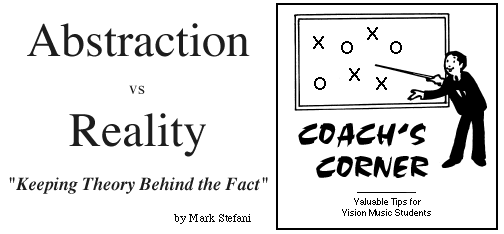
One of the many reasons people have in receiving music instruction, especially if they happen to play the guitar, is to acquire a deeper awareness of the principles of music theory that govern much of what they hear and play. For whatever the cause, students of other musical instruments seem to collect this information more efficiently as they learn. It's very common, on the other hand, for a guitarist/bassist to play for many years primarily by ear, without any solid understanding of why something works or doesn't. This lack, I've found, is what often propels someone to begin studying music to a more serious degree. Unfortunately, guitar teachers and students alike tend to over-emphasize the theoretical side of music, as they often do the technical side as well. This brief article addresses that issue.
I've used the word "balance" several times during past discussions of musical pursuit. That word really applies to this situation, because it's extremely important to keep your mind available when you need it, but slightly behind what you hear and feel. Sort of like a "shadow." I like to call it "keeping the theory behind the fact." How is this balance accomplished?
Well, for starters, you have to be focused and centered on what you're trying to accomplish musically, even if only over a relatively short period of time. To use a rather extreme scenario, for instance, it would be utterly absurd for a guitarist who's main career goal is country/folk vocal accompaniment to actively pursue a master's degree in classical music composition. A much wiser use of time would be in expanding song vocabulary, and acquiring a better awareness of common accompaniment techniques. This type of theoretical pursuit would be much more relevant for that person's goals, and would result in a well-balanced musician. Of course that example is rather ridiculous, but I wanted to make a point. Let's talk about typical situations that I do witness on a regular basis.
One of these concerns the attraction to jazz and classical idioms based on a thirst for sophistication, and not on the sheer love for the music. I have a problem with players saying things like "Well, if I could play jazz (or classical), than I could play anything". History simply doesn't support that notion. There are just so many fine jazz and classical players who sound terrible trying to play even basic blues or rock and roll. And vice versa, of course. The bottom-line is that you don't need to be a "rocket scientist" to make good music, no matter what the style. What you do need is an honest desire, and a path based in reality, not abstraction.
Never forget that music is a "language" with many different dialects. You'll learn the most practical theory by acquiring that language, both by imitating others that speak it well, and by developing a vocabulary of material in that specific style. Want to play blues? Learn the language. Write pop songs? Learn the language. Play jazz? Learn the language. Rock? Classical? Country? Compose a symphony? Learn the language.
You see, the fact of the matter is that "talk is cheap" throughout the music world. What I want is to hear and be someone who can play first, then talk later. And when you think about it realistically, that's exactly what your audience wants, too. Focus on language, feeling, and "keeping the theory behind the fact!" Happy trails...
"Coach's Corner" is an ongoing addition to Vision Music. The purpose of these brief articles is to share philosophy, offer practical insights, and to enhance your musical studies.
For the "ultimate" guitar and bass experience...